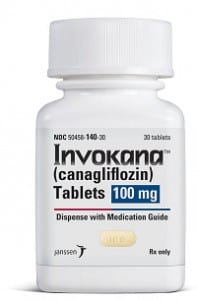 Popular diabetes drugs Invokana, Farxiga, and Jardiance can raise kidney and bladder cancer risk, the risk of ketoacidosis, and the risk of genital amputations.
Popular diabetes drugs Invokana, Farxiga, and Jardiance can raise kidney and bladder cancer risk, the risk of ketoacidosis, and the risk of genital amputations.First introduced in 2013, these SGL2 inhibitors are supposed to work by reducing a certain protein and forcing the kidneys to flush glucose out of the body instead of absorbing it. The problem is that altering the body’s natural processes can cause other problems.
Genital Amputations, other “Side Effects”
Invokana and the other SGL2s can raise the risk of amputations of the genitals or genital amputations.
Fournier’s Gangrene or Necrotizing Fasciitis
The diabetes drugs Invokana, Farxiga, and Jardiance have been linked to causing Fournier’s gangrene of the genitals, or necrotizing fasciitis. The FDA reported in September 2018 that it had received reports of at least 11 people who suffered Fournier’s gangrene of the genitals from Invokana and other SGL2 drugs. All of the people required painful surgery; one of them died from the condition.
$2.5 Billion in Annual Sales
Though SGL2 inhibitors have proven dangerous or deadly for many people, these drugs account for more than $2.5 billion annually in Big Pharma profits. Invokana alone brought its maker, Johnson & Johnson, $1 billion in sales in 2018.
Diabetes Drugs linked to Kidney or Bladder Cancer
Several studies have linked Invokana, Farxiga and Jardiance to kidney and bladder cancer:
- December 2017: An EMPA-REG clinical trial showed that patients taking Jardiance may have twice the risk of bladder cancer.
- October 2017: A joint U.S / Chinese study found a higher risk for bladder cancer with SGLT2 inhibitors.
- June 2015: A University of Colorado study showed that patients taking Farxiga had nearly a six-fold increased risk of suffering bladder cancer.
- February 2015: A study by Endocrinology Network predicted higher risk of UTIs from SGLT2 Inhibitors; UTIs can increase risk of bladder cancer.
- November 2014: Invokana was linked to kidney cancer in animal studies.
- August 2014: A University of Taiwan study found Jardiance patients showed a five (5) times greater risk of bladder cancer. Animals given Invokana suffered higher rates of kidney cancer.
Compensation for those Diagnosed with Kidney, Bladder Cancer
Patients who have been diagnosed with bladder or kidney cancer after taking Invokana, Jardiance or Farxiga may be entitled to compensation for medical costs, pain, suffering, and other losses.
The manufacturers of these medications may be liable for damages if the makers can be shown to have known about the drugs’ dangers but failed to properly warn doctors and patients.
Cancer risks from SGLT2 diabetes drugs first appeared before 2012 in early clinical trials. The FDA granted approval for these drugs only on the condition that their makers would conduct more safety testing in the form of post-marketing studies. Notably, none of these drugs’ makers have added warnings about cancer in the years since, despite several studies suggesting a raised risk.
Kidney and Bladder Cancer
The good news about kidney and bladder cancer is that these types of cancer usually have high rates of treatment success.
Bladder cancer is the 6th most commonly diagnosed type of cancer among Americans. It usually affects males 65-85. The three types of bladder cancer are 1.) transitional cell carcinoma, 2.) squamous cell carcinoma, 3.) adenocarcinom.
Bladder Cancer Symptoms include blood in the urine, pain in the side or back, pain during urination, and frequent urination.
Treatment of bladder cancer may include chemotherapy, radiation therapy, surgery, or immunotherapy. The survival rate with these treatments can be as high as 77%.
Kidney cancer is the 7th most common form of cancer in the U.S. It can affect men and women of any age. The two most common kidney cancer types are renal cell carcinoma (RCC) and transitional cell carcinoma (TCC).
Common symptoms of kidney cancer include blood in the urine, a mass in the abdomen, persistent sweating, abdomen pain, weight loss.
The most common treatment for kidney cancer is surgical removal of the affected kidney or part of it. The survival rate for kidney cancer is around 73%, though it can be as high as 92%.
Free Legal Consultation
If you or a loved one developed bladder or kidney cancer after taking an SGL2 inhibitor drug – such as Invokana, Jardiance, or Farxiga – contact us for a free legal consultation regarding a potential lawsuit against that drug’s maker. We work on a contingency fee basis; we don’t get paid unless we achieve financial compensation for our clients. We look forward to speaking with you.
Related
- Invokana flesh-eating infection warning
- Diabetes Drugs cause Gangrene
- Invokana Dangers seen early
- Invokana Warnings FDA Strengthened
- FDA Invokana Reviewers Tepid Approval

by Matthews & Associates




